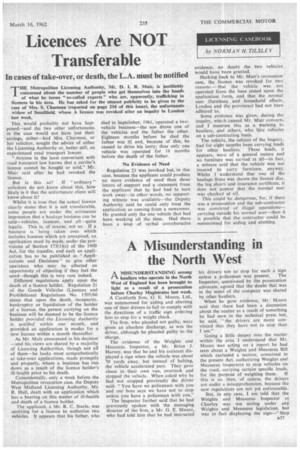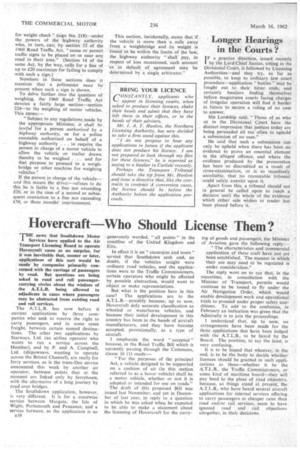A Misunderstanding in the North West
Page 71

Page 72

If you've noticed an error in this article please click here to report it so we can fix it.
A MISUNDERSTANDING among r"k hauliers who operate in the North West of England has been brought to light as a result of a prosecution before Chorley Magistrates last .week. A Carnforth firm, G. E. Moore, Ltd.,
was summonsed for aiding and abetting one of their drivers to fail to comply with the directions of a traffic sign ordering him to stop for a weight check.
The arm, who pleaded not guilty, were given an absolute discharge, as was the driver, although he. pleaded guilty to the charge.
The evidence of the Weights and Measures Inspector, a Mr. Brian J. Harvey, was that he and his assistant displayed a sign when the vehicle was about 70 yards away, but instead of halting, the vehicle accelerated past. They gave chase in their own van, overtook and stopped the vehicle. When asked why he had not stopped previously the driver said: "You have no policemen with you and our boss says we have not to stop unless you have a policeman with you."
The Inspector further said that he had previously spoken with the managing director of the firm, a Mr. G. E. Moore, who had told him that he had instructed his drivers not to stop for such a sign unless a policeman was present. The Inspector, questioned by the prosecution advocate, agreed that the doubt that was in the mind of the company was shared by other hauliers.
When be gave evidence, Mr. Moore said that there had been a discussion about the matter as a result of something he had seen in the technical press but, be said, "the drivers are more convinced that they have not to stop than T am."
Going a little deeper into the matter within the area I understand that Mr. Moore was acting on a report he had seen about a Weights and Measures Bill which excluded a section, contained in the present Act, authorizing Weights and Measures Inspectors to stop vehicles on the road, carrying certain specific loads,
for the purpose of weighing them. If this is so, then, of course, the drivers are under a misapprehension, because the new regulations are not yet enforceable.
But, in any case, I am told that the Weights and Measpres Inspector at Chorley was not acting under any Weights and Measures legislation, but was in fact displaying the sign—" Stop for weight check" (sign No. 218)—under the powers of the highway authority who, in turn, can, by section 52 of the 1960 Road Traffic Act, "cause or permit traffic signs to be placed on or near any road in their area." (Section 14 of the same Act, by the way, calls for a fine of up to £20 maximum for failingto comply with such a sign.)
Nowhere in these sections does it mention that a policeman must be present when such a'sign is shown. To delve further, into the question of weighing, the 1960 Road Traffic Act devotes a fairly large section—section 224—to the weighing of motor vehicles. This states:— " Subject to any regulations made by the appropriate Minister, .it shall he lawful for a person authorized by a highway authority, or for a police constable authorized on behalf of a highway authority , . . to require the person in charge of a motor vehicle to allow the vehicle or trailer drawn thereby to be weighed . . . and for that purpose to proceed to a weighbridge or other machine for weighing vehicles.': If the person in charge of the vehicle—. and this means the driver—refuses to do this he is liable to a fine not exceeding £20, or in the case of a second or subsequent conviction to a fine not exceeding £50, or three months' imprisonment
This section, incidentally, states that if the vehicle is more than -a mile away from a weighbridge and its weight is found to be within the limits of the law, the highway authority " shall pay, in respect of loss occasioned, such amount as in default of agreement may be determined by a single arbitrator."




















































































































